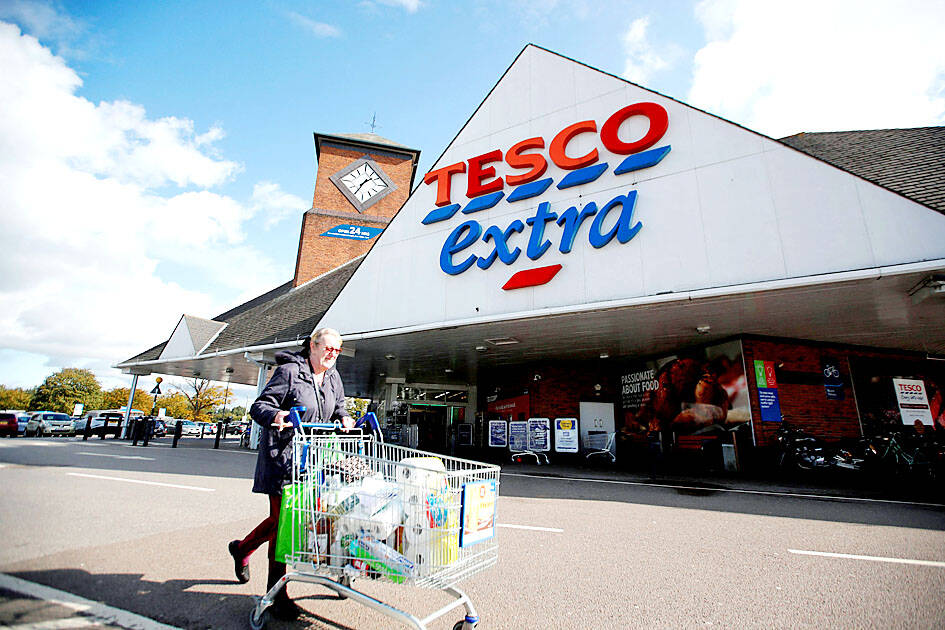Tesco PLC said consumers “watching every penny” are still shopping at its stores amid intense competition from discount grocery rivals.
Britain’s biggest grocer reported better-than-expected sales in the first half of the year and only slightly cut the top end of its profit guidance for this fiscal year, even as costs rise as it tries to keep shelf prices low and increases staff pay.
Tesco is fighting to keep shopper loyalty as consumers in the UK decamp to cheaper rivals Aldi and Lidl. The highest inflation in four decades and rising energy bills are piling pressure on consumers to save money on food. Tesco matches its prices with Aldi across hundreds of basic items that range from teabags to bananas to try to avoid losing market share to the discounter.

Photo: Reuters
“Customers are increasingly concerned about household spending and are watching every penny to make ends meet,” Tesco chief executive officer Ken Murphy said on a call.
Tesco said its hourly workers are to receive an extra £0.20 (US$0.23) an hour taking the base rate of pay to £10.30 an hour to help ease the cost-of-living crisis for its staff. The grocer also raised its dividend and froze pricing on more than 1,000 products until next year.
The grocer now expects retail adjusted operating profit would be between £2.4 billion and £2.5 billion this year, lowering the upper range from £2.6 billion.
Tesco pointed to “significant uncertainties” in the trading environment, particularly consumer behavior.
Rival Morrisons last week reported a 50 percent slump in adjusted third-quarter earnings. Even Aldi, which is winning customers and growing its market share, has seen pretax profit slide more than 85 percent from the year earlier.
Tesco also said it was trying to deliver its three-year savings goal 12 months early and reach £1 billion of savings by February 2024. As part of this, Tesco already cut 1,600 jobs earlier this year by revamping how its stores operate overnight and shutting its discount chain Jack’s.
Tesco, which also owns wholesaler Booker, leads the UK grocery market with a 27 percent share and employs more than 360,000 people. The pay increase for staff at its UK stores comes on top or raises earlier in the year as inflation saps purchasing power.
The grocer is providing extra support to help employees through the cost-of-living crisis with an extended discount allowance, more access to working hours and free food in staff rooms.

CAUTIOUS RECOVERY: While the manufacturing sector returned to growth amid the US-China trade truce, firms remain wary as uncertainty clouds the outlook, the CIER said The local manufacturing sector returned to expansion last month, as the official purchasing managers’ index (PMI) rose 2.1 points to 51.0, driven by a temporary easing in US-China trade tensions, the Chung-Hua Institution for Economic Research (CIER, 中華經濟研究院) said yesterday. The PMI gauges the health of the manufacturing industry, with readings above 50 indicating expansion and those below 50 signaling contraction. “Firms are not as pessimistic as they were in April, but they remain far from optimistic,” CIER president Lien Hsien-ming (連賢明) said at a news conference. The full impact of US tariff decisions is unlikely to become clear until later this month

Popular vape brands such as Geek Bar might get more expensive in the US — if you can find them at all. Shipments of vapes from China to the US ground to a near halt last month from a year ago, official data showed, hit by US President Donald Trump’s tariffs and a crackdown on unauthorized e-cigarettes in the world’s biggest market for smoking alternatives. That includes Geek Bar, a brand of flavored vapes that is not authorized to sell in the US, but which had been widely available due to porous import controls. One retailer, who asked not to be named, because

CHIP DUTIES: TSMC said it voiced its concerns to Washington about tariffs, telling the US commerce department that it wants ‘fair treatment’ to protect its competitiveness Taiwan Semiconductor Manufacturing Co (TSMC, 台積電) yesterday reiterated robust business prospects for this year as strong artificial intelligence (AI) chip demand from Nvidia Corp and other customers would absorb the impacts of US tariffs. “The impact of tariffs would be indirect, as the custom tax is the importers’ responsibility, not the exporters,” TSMC chairman and chief executive officer C.C. Wei (魏哲家) said at the chipmaker’s annual shareholders’ meeting in Hsinchu City. TSMC’s business could be affected if people become reluctant to buy electronics due to inflated prices, Wei said. In addition, the chipmaker has voiced its concern to the US Department of Commerce

STILL LOADED: Last year’s richest person, Quanta Computer Inc chairman Barry Lam, dropped to second place despite an 8 percent increase in his wealth to US$12.6 billion Staff writer, with CNA Daniel Tsai (蔡明忠) and Richard Tsai (蔡明興), the brothers who run Fubon Group (富邦集團), topped the Forbes list of Taiwan’s 50 richest people this year, released on Wednesday in New York. The magazine said that a stronger New Taiwan dollar pushed the combined wealth of Taiwan’s 50 richest people up 13 percent, from US$174 billion to US$197 billion, with 36 of the people on the list seeing their wealth increase. That came as Taiwan’s economy grew 4.6 percent last year, its fastest pace in three years, driven by the strong performance of the semiconductor industry, the magazine said. The Tsai